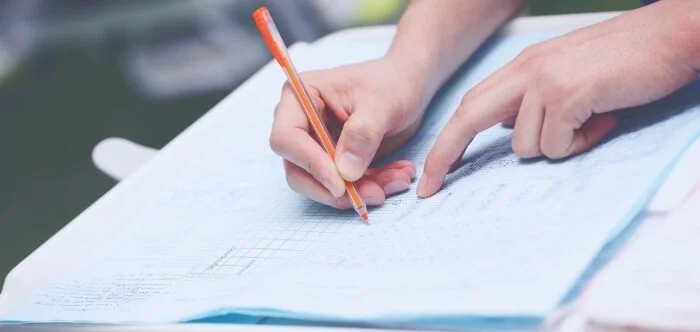Are you preparing to showcase your groundbreaking research at a chemistry conference? Crafting an engaging abstract is the first step to making your work stand out. So, you may be wondering, “How do you write an abstract for a Chemistry Conference?”
To write an abstract for a chemistry conference, concisely summarize your research objectives, methods, key findings, and significance in around 250 words. Use clear language, follow conference guidelines, and highlight the novelty and importance of your work.
Ready to make your research shine? Dive deeper into our blog to discover invaluable tips and insights for crafting a standout chemistry conference abstract. Your journey to conference success starts here!
Core Purpose of Abstracts in Chemistry Conferences
The primary purpose of abstracts in chemistry conferences is to provide a concise overview of research, highlighting its significance and findings. These summaries enable conference attendees to quickly identify relevant presentations, fostering efficient information retrieval.
Abstracts serve as a roadmap, guiding researchers to sessions aligned with their interests and goals. By offering a glimpse into the research’s essence and impact, abstracts help attendees make informed decisions about which presentations to attend, optimizing their conference experience.
Moreover, abstracts play a crucial role in knowledge dissemination. They enable scientists to share their discoveries with a broad audience and spark potential collaborations by drawing attention to the innovative aspects of their work.
The Basics of a Chemistry Conference Abstract
When preparing a chemistry conference abstract, understanding the basics is essential for effective communication and engagement. Here’s what you need to know:
- Concise Summary: Abstracts should offer a brief but comprehensive overview of your research, including objectives, methods, and key findings. This snapshot should give readers a clear idea of what your presentation will entail.
- Clear Language: Use straightforward and reader-friendly language to ensure that both experts and non-experts can grasp your work’s significance. Avoid jargon and complex terminology.
- Adherence to Guidelines: Follow the conference’s specific abstract submission guidelines regarding word count, formatting, and content requirements. Deviating from these guidelines can result in rejection.
- Highlight Novelty: Emphasize what sets your research apart—any unique approaches, findings, or contributions to the field. Explain how your work advances existing knowledge.
- Significance: Clearly state the broader implications of your research and its potential impact on the chemistry community. Why should others care about your findings? Connect the dots for your readers.
- Call to Action: Encourage readers to explore your presentation further by generating interest and curiosity. Tease the exciting aspects of your research, leaving them eager to attend your session.
Crafting a compelling chemistry conference abstract is your opportunity to make a memorable impression. Make it count! Your abstract serves as the gateway to your research, so ensure it captivates and invites others to delve deeper into your work.
Types of Chemistry Conference Abstract You Can Write
Chemistry conferences offer a dynamic platform for researchers to share their discoveries and insights. To make the most of these opportunities, it’s crucial to understand the various types of abstracts you can craft to suit your presentation:
Research Abstracts
These provide an in-depth overview of your original research, encompassing clear objectives, detailed methodologies, comprehensive results, and meaningful conclusions. They showcase the core of your scientific investigation, highlighting the novelty and significance of your findings.
Review Abstracts
Summarize comprehensive literature reviews or surveys, not only highlighting key findings but also identifying research gaps and proposing potential directions for future studies. Emphasize the broader implications of the reviewed literature in shaping the field.
Case Study Abstracts
Detail unique case studies or applications of chemical principles, offering insights into real-world scenarios, practical challenges, innovative solutions, and the potential for broader applications. Show how your case study contributes to solving real-world problems.
Poster Abstracts
Designed for poster presentations, these succinctly convey the main points of your poster, encouraging attendees to visit your display for a deeper exploration of your research. Mention the key visuals, data, and takeaways that participants can expect from your poster.
Theoretical Abstracts
Focus on theoretical aspects, such as computational models, hypotheses, or groundbreaking theoretical frameworks, and their implications for chemistry. Explain how your theoretical work advances the understanding of chemical phenomena.
Educational Abstracts
Share innovative teaching methods, curriculum developments, or educational research in chemistry education. Discuss the practical implications of your educational insights and how they can benefit both students and educators.
Each type of abstract has a unique purpose, helping you match your presentation to your research goals. Picking the right one ensures your message connects with your audience and conveys your work’s significance in the chemistry field.
How Do You Write an Abstract for a Chemistry Conference?
Crafting an abstract for a chemistry conference is a vital skill for researchers looking to share their work effectively and make a meaningful impact on the scientific community. Here’s a comprehensive step-by-step guide on how to write an abstract for a chemistry conference that will help you showcase your research with clarity and precision.
Step-1. Define Your Objectives
Clearly define the objectives of your research, specifying the research question or problem you’re addressing. Explain why your work is relevant to the conference theme or the broader field of chemistry. Be concise and specific to grab the reviewers’ attention.
Step-2. Summarize Your Methods
Provide a brief but informative overview of the methods and techniques you employed in your research. Highlight any innovative or unique approaches you used and why they were chosen. This section should give reviewers confidence in your research methodology.
Step-3. Key Findings and Results
Summarize the most significant findings and results of your study, emphasizing their relevance and impact. Use quantitative data when possible to support your claims, making your abstract more compelling. Mention any unexpected or novel discoveries that set your research apart.
Step-4. Highlight Significance
Explain the broader significance of your research within the field of chemistry. Discuss how your work contributes to existing knowledge, addresses current challenges, or opens up new avenues for research. Consider the practical applications or potential benefits of your findings.
Step-5. Structure and Clarity
Organize your abstract logically, ensuring a clear flow from the introduction to the conclusion. Use concise, reader-friendly language, avoiding unnecessary jargon. Make sure each sentence contributes to the overall coherence of the abstract. Consider using subheadings if they are allowed to enhance clarity.
Step-6. Proofread and Edit
Before submission, carefully proofread your abstract for grammar, spelling, and clarity. Seek feedback from peers, mentors, or colleagues to refine your abstract further. Ensure that your abstract adheres to the specified word limit without sacrificing essential content.
By following these steps and incorporating these additional insights, you can create a well-structured and engaging abstract that effectively communicates the value and impact of your research to fellow conference attendees and reviewers.
Typical Errors to Avoid While Writing a Chemistry Conference Abstract
When crafting a chemistry conference abstract, avoiding common errors is crucial to ensure your work is effectively communicated. Here are key pitfalls to steer clear of:
- Excessive Technical Jargon: Avoid overwhelming readers with complex terminology. Use clear, concise language to make your abstract accessible to a broader audience.
- Lack of Clarity: Ensure your abstract is well-structured and logically organized. Ambiguity and disorganization can confuse readers and diminish the impact of your research.
- Oversharing Details: Resist the temptation to include excessive experimental details or data. Focus on conveying the essence of your research without overwhelming with specifics.
- Ignoring Guidelines: Always adhere to the conference’s abstract submission guidelines regarding word count, formatting, and content. Failure to do so can result in rejection.
- Missing Key Points: Don’t forget to include critical elements like research objectives, methods, key findings, and significance. An incomplete abstract can leave readers with unanswered questions.
- Neglecting Significance: Highlight the broader implications and significance of your research. Explain why it matters in the context of chemistry and its potential impact.
By avoiding these common errors, you can ensure your chemistry conference abstract effectively conveys your research and engages readers.
Writing Chemistry Conference Abstract- How Does it Benefit You?
Crafting a chemistry conference abstract is a vital step in the world of scientific research, offering a multitude of benefits for researchers. It’s more than just a document; it’s a gateway to showcasing your work, forging connections, and advancing your academic journey. Here’s a detailed exploration of how it can significantly advantage you:
Showcase Your Expertise
Writing an abstract allows you to demonstrate your knowledge and expertise in your specific area of chemistry. It positions you as a credible contributor to the field, showcasing your in-depth understanding of your research domain.
Networking Opportunities
Presenting at a conference provides a dynamic platform to connect with fellow researchers, potential collaborators, and professionals who share your interests. These interactions can lead to valuable collaborations, joint research projects, and long-lasting professional relationships, enriching your academic journey.
Feedback and Improvement
Sharing your work through an abstract invites constructive feedback from peers and experts in your field. This feedback is instrumental in refining your research, improving its quality, and addressing potential weaknesses or blind spots, ultimately strengthening your findings and scientific contributions.
Professional Development
Presenting an abstract at a conference is a tangible marker of your commitment to academic and professional development. It demonstrates your dedication to staying current in your field, enhancing your credibility within the scientific community and potential employers.
Visibility and Recognition
A well-crafted abstract can lead to increased visibility within the scientific community. If your research is groundbreaking or addresses critical issues, it may attract recognition or awards, further establishing your reputation as a noteworthy researcher.
Contributing to Advancements
By sharing your findings in an abstract, you actively contribute to the collective knowledge of chemistry. Your research serves as a building block for future scientific investigations, inspiring others and potentially leading to further discoveries and advancements in the field, leaving a lasting legacy.
Crafting a chemistry conference abstract is not only beneficial for you personally and professionally, but it also helps advance science as a whole. It’s a crucial part of your research journey, enhancing your academic and scientific career.
Conclusion
Mastering the art of crafting an effective chemistry conference abstract is a valuable skill for researchers. It serves as a powerful tool for sharing research, establishing expertise, and fostering connections within the scientific community.
By following the step-by-step guide on “How do you write an abstract for a Chemistry Conference?”, you can create abstracts that captivate your audience and communicate findings. These abstracts are essential to the core purpose of abstracts in chemistry conferences: providing a concise overview of research and making it easier for attendees to navigate and identify presentations of interest.
So, whether you’re presenting groundbreaking work or exploring the latest breakthroughs, understanding the significance of well-crafted abstracts is key to success in the world of chemistry conferences.








